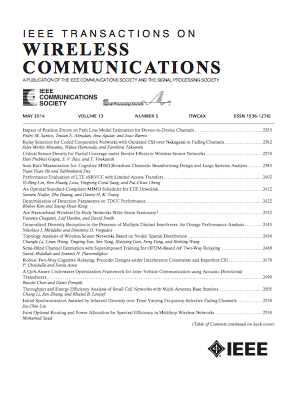面向网络物理系统的目标导向型无线通信资源分配
IF 10.7
1区 计算机科学
Q1 ENGINEERING, ELECTRICAL & ELECTRONIC
引用次数: 0
摘要
智能电网和车载网络等无线边缘新型工业应用的激增,要求网络物理系统(CPS)不断进步。CPS 的性能与 "最后一英里 "无线通信网络密切相关,由于其固有的资源有限,这些网络往往成为瓶颈。当前的 CPS 运行往往将无线通信网络视为不可预测、不可控制的变量,忽视了无线网络潜在的适应性,导致 CPS 运行效率低下且过于保守。同时,当前的无线通信往往更关注吞吐量和其他传输相关指标,而不是 CPS 目标。在本研究中,我们引入了面向目标的无线通信资源分配框架,考虑了 CPS 运行目标的数据语义和重要性。这从控制论的角度保证了 CPS 的最佳性能。我们提出了一个带宽分配问题,旨在最大化传输数据对 CPS 运行目标的信息效用增益。由于面向目标的带宽分配问题是一个大规模组合问题,我们提出了一种分而治之的贪婪求解算法。首先将信息效用增益近似分解为边际效用信息增益,并以并行方式计算。随后,带宽分配问题被重新表述为一个包问题(knapsack problem),可以在保证次优间隙的情况下进一步贪婪求解。我们进一步演示了如何将我们提出的面向目标的带宽分配算法应用于四个潜在的 CPS 应用中,包括数据驱动决策、边缘学习、联合学习和分布式优化。通过仿真,我们证实了我们提出的面向目标的带宽分配框架在实现 CPS 目标方面的有效性。本文章由计算机程序翻译,如有差异,请以英文原文为准。
Goal-Oriented Wireless Communication Resource Allocation for Cyber-Physical Systems
The proliferation of novel industrial applications at the wireless edge, such as smart grids and vehicle networks, demands the advancement of cyber-physical systems (CPSs). The performance of CPSs is closely linked to the last-mile wireless communication networks, which often become bottlenecks due to their inherent limited resources. Current CPS operations often treat wireless communication networks as unpredictable and uncontrollable variables, ignoring the potential adaptability of wireless networks, which results in inefficient and overly conservative CPS operations. Meanwhile, current wireless communications often focus more on throughput and other transmission-related metrics instead of CPS goals. In this study, we introduce the framework of goal-oriented wireless communication resource allocations, accounting for the semantics and significance of data for CPS operation goals. This guarantees optimal CPS performance from a cybernetic standpoint. We formulate a bandwidth allocation problem aimed at maximizing the information utility gain of transmitted data brought to CPS operation goals. Since the goal-oriented bandwidth allocation problem is a large-scale combinational problem, we propose a divide-and-conquer and greedy solution algorithm. The information utility gain is first approximately decomposed into marginal utility information gains and computed in a parallel manner. Subsequently, the bandwidth allocation problem is reformulated as a knapsack problem, which can be further solved greedily with a guaranteed sub-optimality gap. We further demonstrate how our proposed goal-oriented bandwidth allocation algorithm can be applied in four potential CPS applications, including data-driven decision-making, edge learning, federated learning, and distributed optimization. Through simulations, we confirm the effectiveness of our proposed goal-oriented bandwidth allocation framework in meeting CPS goals.
求助全文
通过发布文献求助,成功后即可免费获取论文全文。
去求助
来源期刊
CiteScore
18.60
自引率
10.60%
发文量
708
审稿时长
5.6 months
期刊介绍:
The IEEE Transactions on Wireless Communications is a prestigious publication that showcases cutting-edge advancements in wireless communications. It welcomes both theoretical and practical contributions in various areas. The scope of the Transactions encompasses a wide range of topics, including modulation and coding, detection and estimation, propagation and channel characterization, and diversity techniques. The journal also emphasizes the physical and link layer communication aspects of network architectures and protocols.
The journal is open to papers on specific topics or non-traditional topics related to specific application areas. This includes simulation tools and methodologies, orthogonal frequency division multiplexing, MIMO systems, and wireless over optical technologies.
Overall, the IEEE Transactions on Wireless Communications serves as a platform for high-quality manuscripts that push the boundaries of wireless communications and contribute to advancements in the field.

 求助内容:
求助内容: 应助结果提醒方式:
应助结果提醒方式:


